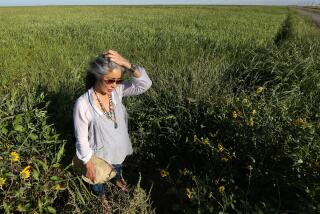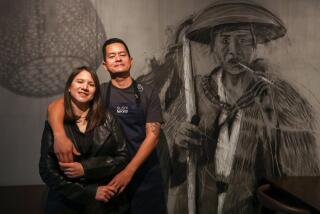Japanese, Pressured to Import U.S. Beef, Buy Big Montana Cattle Ranch
DILLON, Mont. — One step inside the ranch house lies an indication of the changes afoot: three pairs of leather slippers, neatly arranged.
Traditions at the old Selkirk Ranch are shifting from West to East. The 77,000-acre spread in southwestern Montana is now the Zenchiku Land & Livestock Co., perhaps the only Japanese-owned and -operated cattle ranch in America.
The 1988 purchase for a reported $13 million by Zenchiku Co. Ltd.--Japan’s largest meat distributor--reflects an increasing Japanese presence in the U.S. beef industry, with investments in feedlots, packing plants and ranches.
But Japanese ownership remains a tiny fraction of the multibillion-dollar U.S. beef industry, said Steve Kay, editor of Cattle Buyer Weekly in Petaluma, Calif. “It began with a flurry a few years ago and has tapered off. They’re still working to make connections to get the kind of cattle they want.”
As Japan stood poised in 1988 to relax restrictions on imported beef, Zenchiku sought a position in the U.S. market to control the product from the pasture to the dinner plate, ranch manager John Morse Jr. said.
Marty Strange, of the Center for Rural Affairs in Walthill, Neb., said that Japanese investment in the American beef industry is a predictable consequence of a U.S. trade policy that seeks to force Japan to compete in agriculture.
“They hadn’t shown any interest in buying American farmland until we insisted they buy American beef,” Strange said. “You can’t force the country that is stronger than you in almost every (economic) sector to compete with you in the one sector where you have a natural advantage, because they don’t have to compete with you. They’ll buy you instead.”
Japan agreed last year to eliminate its beef import quota over three years and reduce effective tariffs from 125% to 50% over six years. The United States now provides slightly more than half of Japan’s beef imports, which make up about 50% of Japanese beef consumption.
That consumption of beef could triple within 20 years, which should mean a substantial increase in U.S. beef exports to Japan, Morse said.
Zenchiku will have an advantage over most American-owned companies because its managers better understand the Japanese market and style of doing business, he added.
“All these things that are unique to Japan are hurdles to everyone else but me,” he said. “But I must devote a lot of my time to cultural issues that others don’t think are important.”
Japanese consumers are pickier than Americans, preferring fresh meat with more “marbling,” Morse said. Japanese businesses strive to meet that demand, but “in America, we usually say, ‘Here is our product, buy it if you want--take it or leave it.’ We say, ‘Here are their standards--we’re going to meet them.’
“If you want to be a successful importer, price is not enough to get you into that marketplace. . . . It’s so delicate that our parent company was not willing to buy our beef (in 1989) as a name product.”
Although a few U.S. ranches are controlled by the Japanese through lease agreements or partial ownership, Morse believes Zenchiku Land & Livestock is the only Japanese-owned and -operated working cattle ranch in the country.
Cows from the 3,000-head herd are custom-fed and slaughtered in the United States, then shipped to Japan. Few American ranches have Zenchiku’s “vertical integration”--controlling the product from pasture to consumer.
Morse would not release production figures but said that the ranch sent more cattle to Japan last year than all other Montana exporters had in the last 10 years. Nearly two-thirds of the ranch’s production was shipped to Japan, and its 1989 sales of $1.5 million were less than 1% of the parent company’s annual sales.
Aside from the obvious Japanese connection, Zenchiku is not much different from any modern American cattle ranch. Its managers are college-educated, its operation is computerized, its employees usually wear cowboy hats and boots.
“We don’t honestly think we’re any smarter than anyone else,” Morse said. “Unfortunately, most agricultural producers have been so financially beat up in recent years that they really can’t sit back and do this type of planning.”
The ranch employs 16 people, including one American--Seth Burns of Big Timber, Zenchiku’s first American management trainee--and two Japanese trainees. “They are to become a bridge for us to our customers,” Morse said.
This month, Burns goes to Japan for three years. He will study the language, culture and business customs while living in a company dormitory in Tokyo.
Zenchiku settled on the ranch southeast of Dillon because of its quality cattle, rural nature and receptive community, Morse said. “We should be viewed locally as a stable employer. We will be here in five years, we will be here in 10 years and maybe we’ll be here in 30 years.”
More to Read
Sign up for Essential California
The most important California stories and recommendations in your inbox every morning.
You may occasionally receive promotional content from the Los Angeles Times.










